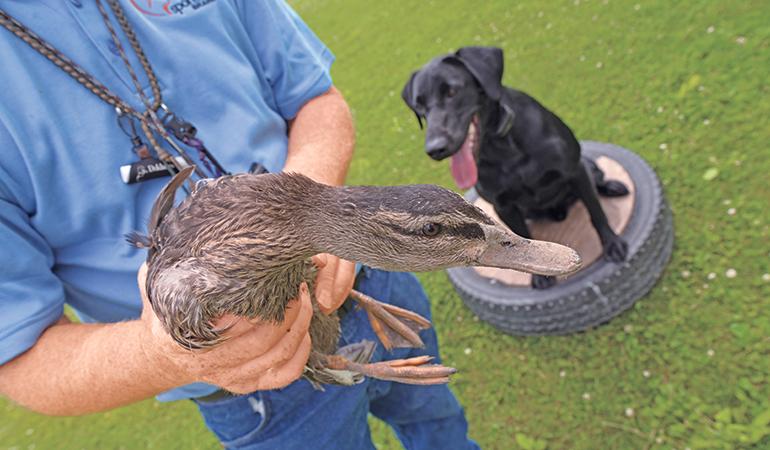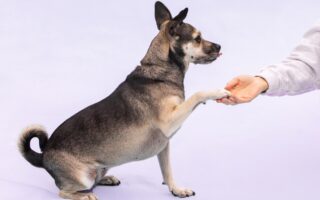Title: The Quack of the Canine: Unraveling the Art of Duck Dog Training
In the serene early morning light, the gentle ripple of water shimmers under the watchful eye of a dedicated trainer. Here, nestled in the lush embrace of nature, a unique bond between dog and handler flourishes, echoing the harmonious dance of hunter and hunted. Duck dog training, an art steeped in tradition and skill, transcends the mere act of obedience; it forges a partnership rooted in trust, communication, and instinct. As we dive into the intricacies of this specialized training, we’ll explore techniques that have been honed over generations, the qualities that make certain breeds particularly adept at duck hunting, and the profound connection that emerges when a canine companion is guided to meet the challenges of the wilderness. Whether you’re a seasoned trainer or an enthusiastic novice, this journey through the captivating world of duck dog training promises to enlighten, inspire, and ignite a passion for the thrill of the chase.
Table of Contents
- Mastering the Basics of Duck Dog Commands
- Techniques for Building Reliable Retriieval Skills
- Enhancing Water Confidence for Effective Duck Retrieval
- Navigating Hunting Scenarios: Strategies for Success
- Q&A
- Closing Remarks
Mastering the Basics of Duck Dog Commands
Training your duck dog to respond to basic commands is essential for successful hunting and bonding. Starting with simple yet effective commands will lay the groundwork for more advanced training later on. Focus on commands like:
- Sit: An essential command for control during hunts.
- Stay: Important for keeping your dog in a designated area.
- Come: Critical for recall when you’re ready to call them back.
- Fetch: The core of retrieving trained behaviors that your dog will need.
- Heel: To ensure that your dog remains by your side while walking.
When teaching these commands, consistency is key. Use positive reinforcement techniques, such as treats and praise, to encourage your dog’s progress. Here’s a simple table that outlines the basic commands and suggested rewards to keep your training impactful:
| Command | Suggested Reward |
|---|---|
| Sit | Small treat or verbal praise |
| Stay | Pat on the head and a clicker sound |
| Come | Favorite toy or a fun game |
| Fetch | Excited praise and playtime |
| Heel | Long-lasting chew or belly rubs |
Techniques for Building Reliable Retriieval Skills
Building reliable retrieval skills in a duck dog requires a blend of patience, practice, and structured techniques. Start by creating a comfortable and engaging training environment. Regular sessions in a distraction-free area can help your dog focus on the task at hand. Gradually introduce distractions in a controlled manner, using positive reinforcement to encourage successful retrieves. Implementing a consistent command pattern is also crucial; it reinforces your dog’s understanding and enhances memorization. When your dog successfully retrieves an item, reward him with praise, treats, or playtime to solidify the behavior.
Incorporating varied retrieval tasks can further enhance your dog’s skills. Mix up the items you want your dog to retrieve; this can include dummies, balls, or plush toys. By diversifying the training content, your dog will remain engaged and adaptable. It’s also beneficial to track progress through a simple log, documenting key aspects such as retrieval success rates, distractions faced, and rewards used. This can help you tweak your approach and ensure continued improvement. Consider using the following table to assess your dog’s performance during training sessions:
| Session Number | Date | Item Retrieved | Success Rate | Notes |
|---|---|---|---|---|
| 1 | 02/01/2023 | Dummy | 90% | Minimal distractions |
| 2 | 02/08/2023 | Ball | 80% | Some distractions |
| 3 | 02/15/2023 | Plush Toy | 95% | High motivation |
Enhancing Water Confidence for Effective Duck Retrieval
Water retrieves can be challenging for many dogs, especially if they lack confidence in aquatic environments. To build your dog’s comfort and ease in the water, start with gradual introductions. Consider the following steps:
- Begin with shallow, calm waters to allow your dog to explore at their own pace.
- Utilize a favorite toy or bumper to encourage swimming; this familiar object can motivate them to venture deeper.
- Reward your dog with positive reinforcement, such as praise or treats, to associate water with enjoyable experiences.
Once your dog is more comfortable in the water, organizing fun activities can further enhance their confidence. Incorporate these engaging practices:
- Set up a series of short retrieves, gradually increasing distances as their confidence builds.
- Introduce controlled scenarios where they retrieve ducks or dummies from varied water conditions to adapt to different challenges.
- Participate in group sessions with other dogs to encourage social learning and healthy competition.
| Activity | Purpose | Frequency |
|---|---|---|
| Shallow Water Walks | Build confidence | 2-3 times/week |
| Controlled Retrieve Games | Develop skills | Weekly |
| Playdates with Other Dogs | Encourage socialization | 2 times/month |
Navigating Hunting Scenarios: Strategies for Success
When it comes to hunting with your duck dog, successful scenarios often rely on a well-structured training regimen. Begin by focusing on basic obedience commands to ensure your dog is responsive and reliable. Here are some essential commands that can set the foundation for effective hunting:
- Sit – teaches patience and control
- Stay – crucial for holding positions while hunting
- Come – necessary for retrieving from distance
- Fetch – instills the excitement for retrieving birds
Beyond obedience, introduce your dog to realistic hunting scenarios to build its confidence and adaptability. This includes exposure to sounds, scents, and environments it will encounter on the field. Utilize decoys and dummies in different settings, simulating various hunting conditions. Consider the following table for enhancing training sessions:
| Training Aspect | Recommended Activities |
|---|---|
| Sound Exposure | Play audio of quacking and gunfire |
| Retrieval | Practice with both water and land retrieves |
| Environment Adaptation | Walk your dog in marshes and fields |
Q&A
Q&A: The Quirky World of Duck Dog Training
Q1: What exactly is duck dog training?
A1: Duck dog training is a specialized form of training that focuses on preparing dogs—typically retrievers or spaniels—for hunting and retrieving waterfowl, such as ducks. This training emphasizes obedience, fieldwork skills, and water retrieves, enabling dogs to efficiently assist their owners during hunting trips.
Q2: Why is it important to train dogs specifically for duck hunting?
A2: Training dogs for duck hunting is crucial for several reasons. A well-trained dog can enhance the hunting experience by ensuring a successful retrieval of ducks and can aid in tracking down downed birds. Furthermore, it promotes safety in the field, as a trained dog is less likely to run off or misinterpret commands during the excitement of a hunt.
Q3: What breeds are best suited for duck dog training?
A3: Breeds often favored for duck dog training include Labrador Retrievers, Golden Retrievers, American Water Spaniels, and Chesapeake Bay Retrievers. These breeds are selected for their natural instincts for retrieving, love for water, and strong desire to please their owners, which are essential traits for effective duck hunting companions.
Q4: What are the essential skills a duck dog should learn?
A4: A duck dog should master several key skills, including commands like sit, stay, and come, as well as more advanced skills like blind retrieves, hand signals, and water entry. Mastering scent work and endurance is also vital, as these help the dog locate and retrieve waterfowl in various environments, including dense marshes.
Q5: How do training methods differ for duck dogs compared to regular obedience training?
A5: While regular obedience training focuses primarily on basic commands and socialization, duck dog training incorporates specific hunting scenarios, including distractions like gunfire and live birds. It also emphasizes water work and retrieving in varied terrains. The training can be more dynamic and involves scenarios that simulate real hunting conditions.
Q6: What equipment is typically used in duck dog training?
A6: Essential equipment for duck dog training includes a good-quality collar, a long leash, training dummies or bumpers (preferably resembling ducks), and a whistle for command communication at a distance. In some cases, hunters may also use specialized vests to keep their dogs visible and protect them in the field.
Q7: Can I train my dog for duck hunting if I’m not a hunter myself?
A7: Absolutely! While having a hunting background can be beneficial, you don’t need to be a hunter to train a duck dog. Many trainers and instructors can teach you the skills necessary, and sessions can be enjoyable learning experiences for both you and your dog, fostering a strong bond along the way.
Q8: Are there any age restrictions for starting duck dog training?
A8: Generally, duck dog training can start as early as 6 to 8 months of age, as this is when dogs begin to develop their focus and attention spans. However, fundamental socialization and basic obedience training can begin even earlier. The key is to tailor the training to your dog’s age, physical development, and temperament, gradually introducing water and retrieving tasks.
Q9: What are common challenges faced during duck dog training?
A9: Some common challenges include distraction management, as the excitement of waterfowl and hunting environments can lead to overstimulation. Additionally, working on retrieving tasks in water can present hurdles, especially if a dog is uncertain or hesitant about water. Patience and consistent training, along with positive reinforcement, can help overcome these obstacles.
Q10: Any tips for owners interested in training their own duck dog?
A10: Start with the basics! Focus on establishing a strong foundation with obedience commands and gradually introduce specialized training related to hunting and retrieving. Keep sessions short, positive, and engaging. Consistency and patience are key; remember that every dog learns at their own pace. Don’t hesitate to reach out to professional trainers for additional guidance, especially during the more challenging aspects of training.
Whether you’re a seasoned hunter or a curious enthusiast, duck dog training offers a unique way to bond with your dog while preparing for amazing outdoor adventures together!
Closing Remarks
As we delve into the unique world of duck dog training, it becomes clear that the bond between handler and dog is not just about obedience or performance—it’s a partnership built on trust, communication, and shared passion. These remarkable canines, with their incredible instincts and unparalleled dedication, embody the spirit of the hunt while also showcasing their ability to connect with us on a profound level. Whether you’re a seasoned waterfowl enthusiast or a novice eager to start your journey, remember that patience and consistency are your greatest allies.
As you step into the grassy marshes or the serene waters, equipped with the knowledge and techniques gained from this exploration, let each training session deepen the connection with your duck dog. Embrace the challenges, celebrate the victories, and, most importantly, relish in the joy that a well-trained duck dog can bring.
In closing, as you venture forth, remember that duck dog training is as much about enjoying the journey with your four-legged companion as it is about achieving success in the field. So harness that enthusiasm, stay committed, and allow the wilderness to witness the incredible partnership you create. Happy training!



